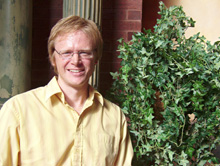Cinephile wins prize for book on multiplex phenom

Charles Acland, winner of the Robinson Book Prize in Communications
Photo by Lina Shoumarova
Communication Studies professor Charles Acland has won an award for his latest book, Screen Traffic: Movies, Multipexes and Global Culture.
The Robinson Book Prize is given annually by the Canadian Communication Association for the best Canadian scholarly work in the field.
“It’s quite a wonderful honour,” Acland said in an interview for Concordia’s Thursday Report. “It means recognition for this kind of cultural analysis. It also means that there is recognition for the work that has been done in Concordia and the Department of Communication Studies.”
It took him six years from the conception to publication last year by Duke University Press, but for Acland, it was time well spent.
“On some level, I think I have always been a cinephile,” he revealed. “Some of my earliest memories are either television or film memories.”
Although it was intended for a primarily academic audience, Screen Traffic speaks equally to cinema fans.
“The idea came out of a certain frustration of having questions about global culture and not knowing where to go for the answers,” Acland explained.
In Screen Traffic, Acland uses data from trade publications, promotional materials, the popular press and economic statistics to examine the changes that have occurred since the mid-’80s in the way people watch movies.
Forced by economic imperatives and the quick popularity of such technological innovations as the VCR, home theatres and the DVD, the major players in the film business had to find ways to “reconstruct what is special about movie-going, to make it a little bit more like an event.”
A key result of this development is the rise of the megaplexes, the gargantuan theaters offering a wide range of screens and frequent start times in addition to all kinds of entertainment activities. Thus the question of location – where do people find the movies they want to see? – becomes a central issue for contemporary cinema and media studies.
The alternative to the megaplex would be the rural movie theatres or the repertory cinemas in the cities, but not being able to compete with the Colossuses, the SilverCities or the AMCs, many of these smaller venues have closed down.
“Montreal is fortunate to have something like Ex-Centris and Cinema du Parc, among others, but only a few years ago, there were more,” Acland said.
In his view, the real diversity of film culture is not to be found in the theaters, but on videotape and DVD. This is particularly true in the case of Canadian popular cinema.
It is in alternative locations like specialty video stores, film societies and especially film festivals, where “you’ll find Canadian artists and Canadian cinema culture really thriving.”
Charles Acland holds a PhD in cultural studies from the University of Illinois, Champaign-Urbana, and a post-doctorate in media studies from Concordia.
Much loved by his students for his engaging teaching, he is also the author of Youth, Murder, Spectacle: The Cultural Politics of “Youth in Crisis” and co-editor of Harold Innis in the New Century: Reflections and Refractions.
As an extension of Screen Traffic, he is currently doing research on the so-called e-cinema, “the digital delivery of motion pictures to movie theatres,” which is likely to bring the next big wave of change to commercial theatres.
Acland has just begun a position as Concordia University Research Chair in Communication Studies for 2004-2009.